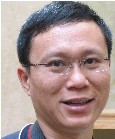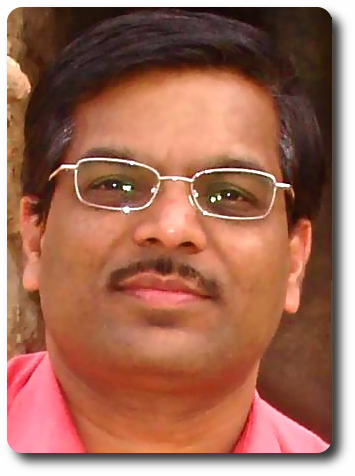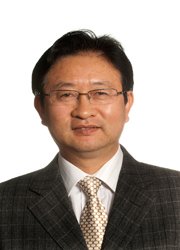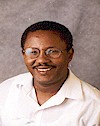Keynote Speakers
Keynotes are for all conferences of BDCloud2014, SocialCom2014, SustainCom2014, and associated workshops and symposia.
��
 |
Professor Jian Pei Simon Fraser University |
| Title: Challenges in
Migrating Big Data Analytics to Clouds �� |
| Abstract:
(Big) Data analytics has achieved well recognized successes using traditional computational architecture, and, at the same time, is facing the grand challenge of scalability. Cloud computing is enticing. However, many well accepted data analytics tasks have not been scaled out effectively yet. In this talk, I, as a data mining veteran, will discuss several challenges in migrating big data analytics to clouds, including search in exponential space of #P-hard problems, interactive mining, and pay-as-you-go. The challenges invite interdisciplinary research and development to unlock the power of big data analytics using the key of edge-cutting cloud computing. |
| Short Bio |
|
Jian Pei is Canada Research Chair (Tier 1) in Big Data Science, and Professor of Computing Science at Simon Fraser University. He is widely regarded as one of the world��s top researchers in the area of data mining and his work has been embraced by industry and government. Since 2000, his research has focused on developing effective and efficient ways to analyze - and capitalize on - the vast stores of data housed in applications such as social networks, network security informatics, healthcare informatics, business intelligence, and web searches. A prolific and widely-cited author, Professor Pei has received many prestigious awards including induction as a Fellow of IEEE. |
��
 |
Rajkumar Buyya University of Melbourne |
| Title: Market-Oriented Cloud Computing and Big Data Applications |
| Abstract:
Computing is being
transformed to a model consisting of services that are
commoditised and delivered in a manner similar to utilities such
as water, electricity, gas, and telephony. In such a model,
users access services based on their requirements without regard
to where the services are hosted. Several computing paradigms
have promised to deliver this utility computing vision. Cloud
computing has emerged as one of the buzzwords in the IT industry
and turned the vision of "computing utilities" into a reality.
Several IT vendors have started offering computation, storage,
and application hosting services, and provide coverage in
several continents, supporting Service-Level Agreements (SLA)
backed performance and uptime promises for their services.
Clouds deliver infrastructure, platform, and software |
| Short Bio |
|
Dr. Rajkumar Buyya is
Professor of Computer Science and Software Engineering, Future
Fellow of the Australian Research Council, and Director of the
Cloud Computing and Distributed Systems (CLOUDS) Laboratory at
the University of Melbourne, Australia. He is also serving as
the founding CEO of Manjrasoft, a spin-off company of the
University, commercializing its innovations in Cloud Computing.
He has authored over 450 publications and four text books
including "Mastering Cloud Computing" published by McGraw Hill
and Elsevier/Morgan Kaufmann, 2013 for Indian and international
markets respectively. He also edited several books including
"Cloud Computing: Principles and Paradigms" (Wiley Press, USA,
Feb 2011). He is one of the highly cited authors in computer
science and software engineering worldwide (h-index=86,
g-index=176, 34300+ citations). Microsoft Academic Search Index
ranked Dr. Buyya as the world's top author in distributed and
parallel computing between 2007 and 2012. "A Scientometric
Analysis of Cloud Computing Literature" by German scientists
ranked Dr. Buyya as the World's Top-Cited (#1) Author and the
World's Most-Productive (#1) Author in Cloud Computing. |
��
 |
Frank Wang University of Kent |
| Title: How will computers evolve over the next 10 years? A Perspective on Cloud Computing/Green Computing/Future Computing. |
| Abstract:
Computer science has impact on many
parts of our lives. Computer scientists craft the
technologies that enable the digital devices we use every
day and computing will be at the heart of future revolutions
in business, science, and society. Our research targets the
next generation computing paradigms and their applications.
We have been working on Cloud Computing and Big Data for
many years. A developed Cloud Computing platform conforms to
the Internet standard and can universally accelerate BigData/Web/Media
applications by a factor up to ten. This work won an ACM/IEEE
Super Computing finalist award. We will also report our
research on Green Computing, Brain Computing and Future
Computing.
��
|
| Short Bio |
|
Frank Z. Wang is the Professor in Future Computing and Head of School of Computing, University of Kent, UK. The School of Computing was formally opened by Her Majesty the Queen. Professor Wang's research interests include cloud computing, big data, green computing, brain computing and future computing. He has been invited to deliver keynote speeches and invited talks to report his research worldwide, for example at Princeton University, Carnegie Mellon University, CERN, Hong Kong University of Sci. & Tech., Tsinghua University (Taiwan), Jawaharlal Nehru University, Aristotle University, and University of Johannesburg. In 2004, he was appointed as Chair & Professor, Director of Centre for Grid Computing at CCHPCF (Cambridge-Cranfield High Performance Computing Facility). CCHPCF is a collaborative research facility in the Universities of Cambridge and Cranfield (with an investment size of £40 million). Prof Wang and his team have won an ACM/IEEE Super Computing finalist award. Prof Wang is Chairman (UK & Republic of Ireland Chapter) of the IEEE Computer Society and Fellow of British Computer Society. He has served the Irish Government High End Computing Panel for Science Foundation Ireland (SFI) and the UK Government EPSRC e-Science Panel. |
��
 |
Professor Albert Zomaya Director, Centre for Distributed and High Performance Computing University of Sydney Australia |
| Title: Efficiency of Resource Abundant Clouds |
| Abstract:
The cloud is well known for its elasticity by leveraging abundant resources. Cloud data centres easily host thousands or even millions of multicore servers. Further, these servers are increasingly virtualized for the sake of data centre efficiency. However, the reality is that these resources are often relentlessly exploited particularly to improve applications performance. Although the elasticity facilitates achieving cost efficiency (or the performance to cost ratio), the ultimate efficiency in resource usage (or more broadly data centres) lies in scheduling and resource allocation strategies that explicitly take into account actual resource consumption. The optimization of resource efficiency in clouds is of great practical importance considering its numerous benefits in the economic and environmental sustainability. In this talk, we will discuss resource efficiency in cloud data centres with an example of large-scale distributed processing applications including scientific workflows and MapReduce jobs. |
| Short Bio |
|
Albert Y. ZOMAYA is currently the Chair Professor of High Performance Computing & Networking and Australian Research Council Professorial Fellow in the School of Information Technologies, The University of Sydney. He is also the Director of the Centre for Distributed and High Performance Computing which was established in late 2009. Professor Zomaya is the author/co-author of seven books, more than 400 papers, and the editor of nine books and 11 conference proceedings. He is the Editor in Chief of the IEEE Transactions on Computers and serves as an associate editor for 19 leading journals. Professor Zomaya is the recipient of the Meritorious Service Award (in 2000) and the Golden Core Recognition (in 2006), both from the IEEE Computer Society. Also, he received the IEEE TCPP Outstanding Service Award and the IEEE TCSC Medal for Excellence in Scalable Computing, both in 2011. Professor Zomaya is an ACM Distinguished Speaker, a Chartered Engineer, a Fellow of AAAS, IEEE, IET (U.K.), and a Distinguished Engineer of the ACM. |
��
 |
Professor Vijay Varadharajan Microsoft Chair Professor in Innovation in Computing Macquarie University Australia |
| Title: Security and Privacy Issues in the Changing Cyber Landscape With Cloud, Big Data and Internet of Technologies |
| Abstract:
In this talk I will begin with a brief look at current trends in the technology scenery and some of the key security challenges that are impacting on business and society. In particular, on the one hand there have been tremendous developments in cyber technologies such as cloud, Big Data and Internet of Technologies. On the other hand, security threats in the cyber space have become more technically sophisticated, better organized and with the readily availability of easy to use tools enabling even ordinary users to conduct severe attacks. At the same time, the economic and social consequences of failing to detect and prevent these attacks are having major impact on businesses, individuals and the wider community. In this talk, we will address some of the key security and privacy challenges in the cyber space, in particular with cloud data storage and provision of cloud services. We will also highlight some fundamental challenges involved with security and privacy issues in Big Data applications. The talk will then conclude by emphasizing the need for security professionals and researchers to rethink cyber security strategy to respond to threats with such emerging technologies. |
| Short Bio |
|
Vijay Varadharajan is the Microsoft Chair Professor in Innovation in Computing in Australia at Macquarie University. He is also the Director of Advanced Cyber Security Research Centre (ACSRC) at Macquarie University. Previously, Vijay headed Security Research worldwide for Hewlett-Packard Labs based at European Headquarters at HP Labs Bristol, UK and US. He led and managed several research projects in UK, US, Germany, France and Italy and under his leadership several security research technologies were transferred into commercially successful HP products generating billions of dollars. He also headed the Technical Security Strategy Initiative at HP under the Senior Vice President of HP. Vijay has had several visiting positions at different institutions over the years including at Microsoft Research Cambridge UK and Redmond, Visiting Professor at the Institute of Mathematical Sciences at National University of Singapore, Invited Professor at French National Research Labs (INRIA), Visiting Professor at eScience Institute, Edinburgh University, Invited Professor at the Indian Inst. of Technology and currently a Visiting Professor at the Chinese Academy of Sciences. Vijay was an inaugural Board Member of International Advisors of TCPA, USA. From 2002, he is on the Trustworthy Computing Advisory Board at Microsoft, USA. From 2011, he is on the International Security Advisory Board SAP (Germany) and Research and Technology Advisory Board SAP (USA). Vijay is also a member of the Australian Government��s Peak Security Advisory Group for the Minister of Broadband, Communications and Digital Economy, Australia, and a member of the expert ICT Advisory Panel at NSW State Government, Australia. He is a member of the Australian Academy of Science National Committee on Information and Communication Systems and was a member of the Australian Government Research Council College of Experts in Engineering, Mathematics and Informatics. He has also been the Technical Board Director of Computer Science at Australian Computer Society. Vijay has been on the Editorial Board of several journals including the IEEE Transactions in Dependable and Secure Computing, IEEE Transactions in Information Forensics and Security, IEEE Transactions in Cloud Computing, the ACM Transactions on Information Systems Security, Springer International Journal of Information Security and IEEE Security and Privacy. Vijay has published over 350 papers in International Journals and Conferences, has co-authored and edited 9 books and holds 3 patents. Vijay is a Fellow of the British Computer Society, a Fellow of the IEE/IET, a Fellow of the Institute of Mathematics, UK, a Fellow of the Engineers Australia and a Fellow of the Australian Computer Society. He also holds a Senior Fellowship from the Australian Academy of Science. |
��
 |
Professor Yanchun Zhang Victoria University Australia
|
| Title: Medical Big Data: Medical/Health Data Mining and Innovative Applications |
| Abstract:
In last few decades, with the advent of
database systems and networking technologies, a huge volume of
health data and valuable medical knowledge have been
electronically available, accessible and processible, especially
over the virtual cyberspace - the Web, even from a remote corner
in the world. Nowadays the wide deployment of Hospital
Information Management Systems (HIMS) and Web based clinical or
medical systems, for example, the Medical Director, a generic GP
clinical system, have made it possible to record, disseminate
and implement the health information and clinical practices
easily and globally. And health care and medical service is
becoming more data-intensive and evidence-based since electronic
health records are used to track individuals' and communities'
health information (particularly changes). These substantially
motivate and advance the emergence and the progress of
data-centric health data and knowledge management research and
practice, for example, Health Informatics. In this talk, we will introduce several case studies and research projects to address the challenges encountered in health service. We will then introduce a framework of data integration, knowledge management and user behaviour modelling for complementing and improving existing health care and service systems. �� |
| Short Bio |
|
Yanchun Zhang is a Professor and Director of the Centre for Applied Informatics at VictoriaUniversity. Dr Zhang obtained a PhD degree in Computer Science from The University of Queensland in 1991. Prof. Zhang' research interests include databases, cooperative transactions management, web information systems, web mining, web services and e-health. He has published over 200 research papers in international journals and conference proceedings including top journals such as ACM Transactions on Computer and Human Interaction (TOCHI), IEEE Transactions on Knowledge and Data Engineering (TKDE), and a dozen of books and journal special issues in the related areas. Dr. Zhang is a founding editor and editor-in-chief of World Wide Web and Health Information Science and Systems. He is Chairman of International Web information Systems Engineering Society (WISE). He was a member ofAustralian Research Council's College of Experts (2008-2010), and is one of the National "Thousand Talents Program" Experts in China with Fudan University. |
��
 |
Professor Muhammad Ali Babar The University of Adelaide Australia
|
| Title: Understanding and Addressing Architectural Challenges of Cloud-Based Systems |
|
Abstract: Like in any other large-scale software intensive system, software architecture is critical in developing and evolving cloud-enabled systems. The role of software architecture in cloud-based system is neither trivial nor well understood. It is important to understand the key architectural challenges in designing and evolving cloud-based systems. To this end, we have been systematically studying several cases of academic efforts and industrial practices aimed at designing and evolving cloud-based systems in private and public sectors. Our goal is provide evidence-based insights to our and others�� efforts aimed at devising novel and innovative approaches and tools for architecting cloud-based systems. The talk will peek through the details of some of the cases to highlight the architectural challenges and some of the solutions to address them. This talk will also share the information gleaned from the studied cases and pinpoint some of the key architecture related areas that need immediate attention of practitioners and researchers. |
| Short Bio |
|
Muhammad Ali
Babar is a Professor of Software Engineering in the School of
Computer Science, the University of Adelaide, Australia. He is
the founder and coordinator of CREST �C Centre for Research on
Engineering Software Technologies (http://crest-centre.net).
He also holds an academic position with IT University of
Copenhagen, Denmark. Prior to this, he was Reader in Soft- ware
Engineering at Lancaster University UK. Previously, he worked as
a researcher and project leaders in different research centers
in Ireland and Australia. His research projects have attracted
funding from various agencies in Denmark, UK, Ireland, and
Australia. He is a member of the steering committees of several
international software engineering and architecture conferences
such as WICSA, ECSA, and ICGSE. He regularly runs tutorials and
gives talks on topics related to cloud computing, software
architecture and empirical approaches at various international
conferences. More information on Prof. M. Ali Babar can be found
at
http://malibabar.wordpress.com |
��
 |
Professor Yang Xiang Deakin University Australia
|
| Title: Application of Data Analytics: Security and Privacy in Social Networks |
|
Abstract: Today's online social networks have pervaded all aspects of our daily lives. With their unparalleled popularity, online social networks have evolved from the platforms for social communication and news dissemination, to indispensable tools for professional networking, social recommendations, marketing, and online content distribution. Their evolution has influenced every technological, societal, and cultural aspect of human beings. They are receiving more and more attention in research communities. It has been widely recognized that security and privacy are the critical issues in online social networks. On one hand, online social networks have been the effective platform for the attackers to launch attacks and distribute malicious information. On the other hand, privacy leakage through online social networks has become common exercise. New methods and tools, consequently, must follow up in order to adapt to this emerging security paradigm. In this talk, we will discuss the security and privacy problems in social networks and how big data analytics can be used to address the problems. |
| Short Bio |
|
Professor Yang Xiang received his PhD in Computer Science from Deakin University, Australia. He is currently a full professor at School of Information Technology, Deakin University. He is the Director of the Network Security and Computing Lab (NSCLab) and the Associate Head of School (Industry Engagement). His research interests include network and system security, distributed systems, and networking. In particular, he is currently leading his team developing active defense systems against large-scale distributed network attacks. He is the Chief Investigator of several projects in network and system security, funded by the Australian Research Council (ARC). He has published more than 170 research papers in many international journals and conferences, such as IEEE Transactions on Computers, IEEE Transactions on Parallel and Distributed Systems, IEEE Transactions on Information Security and Forensics, and IEEE Journal on Selected Areas in Communications. He has published two books, Software Similarity and Classification (Springer) and Dynamic and Advanced Data Mining for Progressing Technological Development (IGI-Global). He has served as the Program/General Chair for many international conferences such as ICA3PP 12/11, IEEE/IFIP EUC 11, IEEE TrustCom 13/11, IEEE HPCC 10/09, IEEE ICPADS 08, NSS 11/10/09/08/07. He has been the PC member for more than 60 international conferences in distributed systems, networking, and security. He serves as the Associate Editor of IEEE Transactions on Computers, IEEE Transactions on Parallel and Distributed Systems, Security and Communication Networks (Wiley), and the Editor of Journal of Network and Computer Applications. He is the Coordinator, Asia for IEEE Computer Society Technical Committee on Distributed Processing (TCDP). He is a Senior Member of the IEEE. |
��
 |
Professor Jemal Abawajy ��
Deakin University
Australia |
| Title: Hybrid Consensus Pruning of Ensemble Classifiers for Big Data Malware Detection |
|
Abstract: Despite of the fact that security and privacy are critical issues in big data, more research needs to be done in the area of malicious software (malware) detection and prevention. In this presentation, we introduce an ensemble classifier and new advanced ensemble pruning method. We show experimental results of the new method as compared to several state-of-art ensemble pruning method for big data platforms. |
| Short Bio |
|
Jemal H. Abawajy is a full Professor and the Director of the Parallel and Distributing Computing (PARADISE) Lab at Deakin University, Australia. He is a Senior Member of IEEE and was a member of the organizing committees for over 400 international conferences serving in various capacities including chair and general co-chair. He has published more than 200 refereed articles, supervised numerous PhD students to completion and is on the editorial boards of many journals. |
��